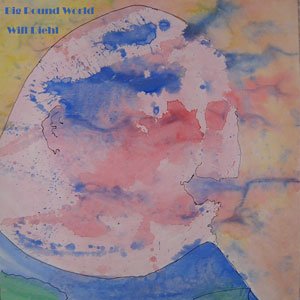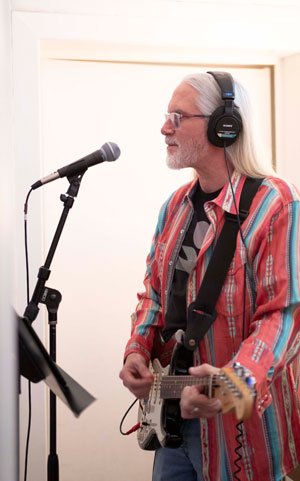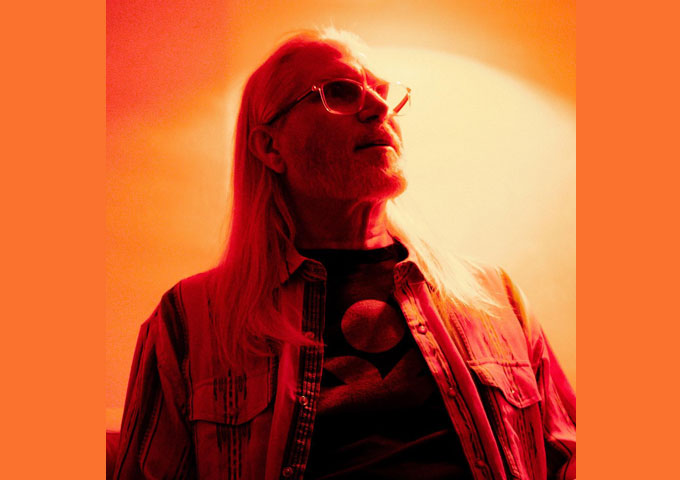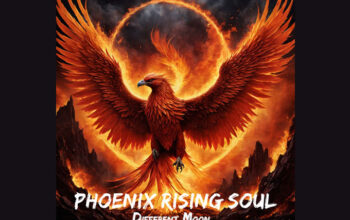Will Diehl is not your average singer-songwriter. A true sonic shapeshifter, Diehl has spent years traversing the expansive terrains of Rock, Americana, instrumental, alternative, pop, blues-rock, meditative, electro-pop, and intimate folk. His musical DNA is defined by fusion, fluidity, and fearlessness, rooted in emotional authenticity and a restless curiosity for sonic exploration. Now, with his latest 10-track magnum opus, “Big Round World” – set for global release on May 19, 2025, but already available on Bandcamp – Diehl consolidates his eclectic sensibilities into a single immersive body of work. The result is a profound, genre-bending reflection of modern existence, a record that speaks not only to the times but also to the timeless. It’s a bold, unfiltered glimpse into the heart of a songwriter who refuses to be boxed in, drawing from a palette that is as intellectually rich as it is emotionally resonant.
The album opens with “A Thousand Missiles”, a chilling meditation on global unrest and the invisible weight of uncertainty. The song confronts the surreal normalcy of life lived in the shadow of existential threat. With deft poeticism, Diehl avoids political grandstanding and instead humanizes the experience of living beneath the possibility of sudden annihilation. Through smoky vocals and spare yet striking instrumentation, he paints a world simultaneously mundane and cataclysmic. It is a haunting reminder of the fragility of peace—and the fierce urgency of valuing each moment. The emotional gravity here is underpinned by subtle, tension-laced arrangements that mirror the creeping anxiety of an uncertain future, asking listeners to contemplate what truly matters when everything feels poised on a knife’s edge.
 Next comes “You’re Gonna Find Out”, a searing critique of information saturation, media manipulation, and the erosion of truth in the digital age. With its hypnotic repetition and lyrical precision, the track lands like a warning bell tolling in the fog. There’s a raw nerve exposed here—an ache for clarity in an age of curated realities. Diehl’s voice carries the weight of disillusionment, yet never relinquishes the quiet hope that truth, though elusive, still matters. There’s a hint of desperation in the delivery, a powerful undercurrent that urges us to wake up, to question, and to resist complacency in a world of algorithms and echo chambers.
Next comes “You’re Gonna Find Out”, a searing critique of information saturation, media manipulation, and the erosion of truth in the digital age. With its hypnotic repetition and lyrical precision, the track lands like a warning bell tolling in the fog. There’s a raw nerve exposed here—an ache for clarity in an age of curated realities. Diehl’s voice carries the weight of disillusionment, yet never relinquishes the quiet hope that truth, though elusive, still matters. There’s a hint of desperation in the delivery, a powerful undercurrent that urges us to wake up, to question, and to resist complacency in a world of algorithms and echo chambers.
“Momentum”, the third track, captures the paradox of progress and the internal conflict it often triggers. The titular motif pounds like a heartbeat throughout the song, suggesting both propulsion and pressure. It’s a stirring meditation on ambition’s bittersweet edge—the beautiful but sometimes brutal march toward a goal that grows distant even as we near it. Here, Diehl dives into the emotional costs of movement and the silent toll of striving. It reflects on how dreams evolve and sometimes drift from their original spark, leaving behind a trail of sacrifice, doubt, and introspection. Musically, it’s both propulsive and restrained, a sonic representation of forward motion tempered by emotional gravity.
The title track, “Big Round World”, is perhaps the album’s philosophical nucleus and thematic cornerstone. A razor-sharp dissection of simplistic thinking in an intricately connected world, the song questions the adequacy of our problem-solving instincts. Diehl‘s lyrical scalpel cuts through the noise to reveal the danger of “linear minds” in a circular world. Yet beneath the critique lies a call for empathy, for a shift in perspective as vast and profound as the world itself. The track invites us to reimagine our approach to complexity, asking us to abandon binary thought and embrace nuance and interdependence. It’s a bold and eloquent reminder that wisdom often lies not in knowing all the answers, but in asking better questions.
Track five, the instrumental “Kaleidoscope”, is an exquisite interlude—a piano-driven reverie with a shuffling beat and hypnotic rhythm. It dances where words fall short, a sonic swirl of texture and movement that gives listeners a chance to breathe and reflect. It’s a moment of calm contemplation amidst the album’s emotional intensity, a meditation on change, beauty, and impermanence. The arrangement feels spontaneous yet deliberate, evoking the shifting forms of its namesake through layered dynamics and fluid melodic turns.
 In “You Knew”, Diehl examines the quiet tragedy of avoidance. The lyrics suggest foreknowledge, denial, and the eventual reckoning with consequences long ignored. With a haunting melodic arc and restrained instrumentation, the song confronts the human tendency to delay the inevitable and the pain that often comes with finally facing it. The track’s emotional resonance is heightened by subtle harmonies and ghostly echoes that haunt the margins of the mix, reinforcing the lingering presence of regret and the tension between what’s known and what’s spoken.
In “You Knew”, Diehl examines the quiet tragedy of avoidance. The lyrics suggest foreknowledge, denial, and the eventual reckoning with consequences long ignored. With a haunting melodic arc and restrained instrumentation, the song confronts the human tendency to delay the inevitable and the pain that often comes with finally facing it. The track’s emotional resonance is heightened by subtle harmonies and ghostly echoes that haunt the margins of the mix, reinforcing the lingering presence of regret and the tension between what’s known and what’s spoken.
“Watch the Clock” follows with aching poignancy. It’s a meditation on missed connections, unspoken feelings, and the unrelenting passage of time. Diehl captures the difficulty of communication, the longing for reconciliation, and the flicker of hope that it might not be too late. The song’s ticking metaphor urges us to speak, to mend, and to hold tight to what matters before it slips away. Its slow build and aching vocal delivery encapsulate the tension between urgency and hesitation, reminding us that healing often hinges on our ability to be vulnerable, even when it’s uncomfortable.
“Where You’ll Find Me” is an anthem for those who live in the margins, between certainties, in the flux. This eighth track is steeped in lyrical liminality, speaking to the souls who find solace not in destination but in the act of becoming. It’s a celebration of the threshold spaces—fluid, dynamic, and real. The track’s cosmic-like arrangement conjures a sense of floating, of drifting intentionally through the blurred boundaries of identity, love, and self-discovery. Diehl invites listeners to find strength in ambiguity, to embrace transformation as a form of belonging.
Returning to the “Kaleidoscope” theme—but now with lyrics—track nine reframes the earlier instrumental as a reflection on life’s cyclic beauty and pain. The track acknowledges despair but ultimately champions resilience. Like the object it’s named for, the song suggests that broken fragments can still form something beautiful when viewed through a shifting lens. It’s a hopeful coda to an otherwise meditative piece, tying together the album’s themes of perspective, impermanence, and renewal. With its harmonic vocal refrains and gently pulsing rhythm, it acts as a lighthouse in the storm, guiding the listener toward acceptance and peace.
The album closes with the luminous “I Am Free”, a triumphant declaration of emotional liberation and hard-won peace. It is a celebration of endurance, of loving fiercely despite adversity, and of dreaming when hope feels fragile. The song encapsulates the entire emotional arc of the album: from chaos to clarity, from isolation to connection. It’s a cathartic, soaring finale that leaves the listener not just satisfied but transformed—reminded of the power of resilience, love, and the enduring human spirit.
“Big Round World” is not just a collection of songs—it is a mirror held to the modern psyche, a call to consciousness wrapped in melody. With this album, Will Diehl has crafted a sonic journey that challenges, soothes, and ultimately elevates. It is an essential listen for anyone seeking music that doesn’t just entertain, but enlightens. Deeply emotional yet intellectually grounded, experimental yet accessible, “Big Round World” stands as a testament to the limitless potential of genre-defying artistry and a powerful reminder that music, at its best, helps us better understand ourselves and the world we inhabit.
OFFICIAL LINKS:
https://willdiehlmusic.bandcamp.com/album/big-round-world
https://www.facebook.com/willdiehlmusic
https://music.youtube.com/channel/UCKcUPGMO7Fvh5M9OFXkSJnw
https://www.instagram.com/willdiehl/
https://willdiehl.com/home





